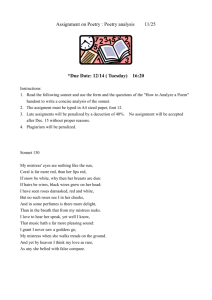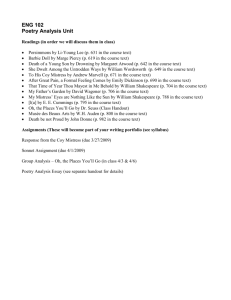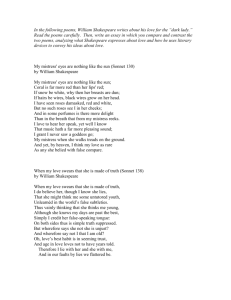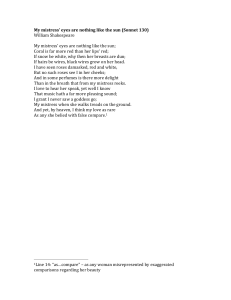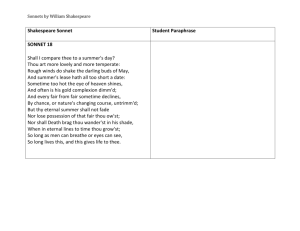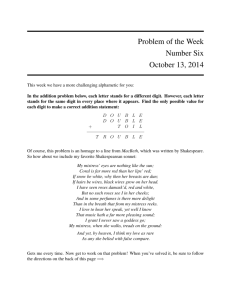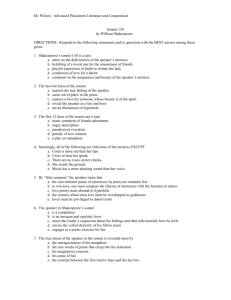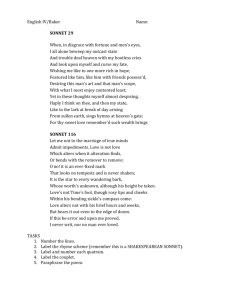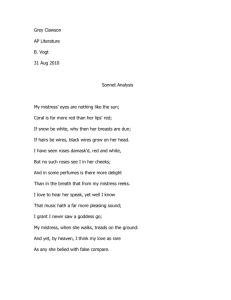Sonnet 130 and Jason Mraz “Just the Way You Are”
advertisement
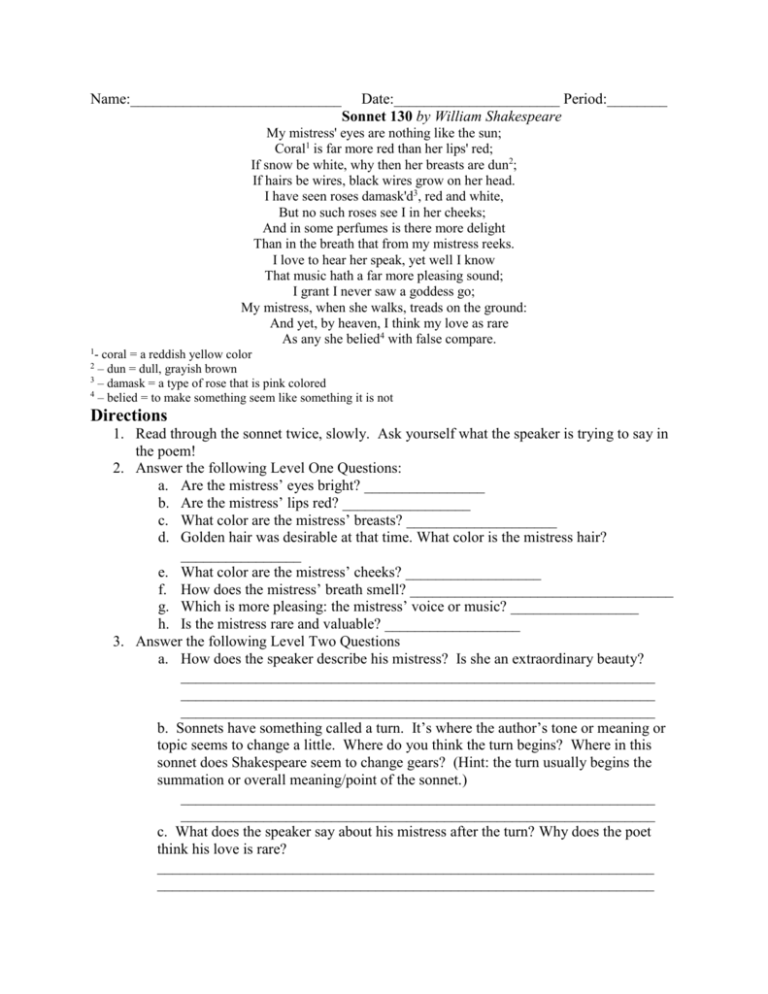
Name:____________________________ Date:______________________ Period:________ Sonnet 130 by William Shakespeare My mistress' eyes are nothing like the sun; Coral1 is far more red than her lips' red; If snow be white, why then her breasts are dun2; If hairs be wires, black wires grow on her head. I have seen roses damask'd3, red and white, But no such roses see I in her cheeks; And in some perfumes is there more delight Than in the breath that from my mistress reeks. I love to hear her speak, yet well I know That music hath a far more pleasing sound; I grant I never saw a goddess go; My mistress, when she walks, treads on the ground: And yet, by heaven, I think my love as rare As any she belied4 with false compare. 1 - coral = a reddish yellow color – dun = dull, grayish brown 3 – damask = a type of rose that is pink colored 4 – belied = to make something seem like something it is not 2 Directions 1. Read through the sonnet twice, slowly. Ask yourself what the speaker is trying to say in the poem! 2. Answer the following Level One Questions: a. Are the mistress’ eyes bright? ________________ b. Are the mistress’ lips red? _________________ c. What color are the mistress’ breasts? ____________________ d. Golden hair was desirable at that time. What color is the mistress hair? ________________ e. What color are the mistress’ cheeks? __________________ f. How does the mistress’ breath smell? ___________________________________ g. Which is more pleasing: the mistress’ voice or music? _________________ h. Is the mistress rare and valuable? __________________ 3. Answer the following Level Two Questions a. How does the speaker describe his mistress? Is she an extraordinary beauty? _______________________________________________________________ _______________________________________________________________ _______________________________________________________________ b. Sonnets have something called a turn. It’s where the author’s tone or meaning or topic seems to change a little. Where do you think the turn begins? Where in this sonnet does Shakespeare seem to change gears? (Hint: the turn usually begins the summation or overall meaning/point of the sonnet.) _______________________________________________________________ _______________________________________________________________ c. What does the speaker say about his mistress after the turn? Why does the poet think his love is rare? __________________________________________________________________ __________________________________________________________________ Just The Way You Are by Bruno Mars Oh, her eyes, her eyes make the stars look like they're not shining Her hair, her hair falls perfectly without her trying She's so beautiful And I tell her everyday. Yeah, I know, I know when I compliment her, she won't believe me And it's so, it's so sad to think that she doesn't see what I see But every time she asks me do I look okay? I say 'Cause you're amazing Just the way you are And when you smile The whole world stops and stares for a while 'Cause girl, you're amazing Just the way you are Oh, you know, you know I'd never ask you to change If perfect's what you're searching for, then just stay the same So don't even bother asking if you look okay You know I'll say When I see your face There's not a thing that I would change Directions 1. Read the modern “love poem” by Bruno Mars. 2. Answer the following Questions: a. What is the speaker saying about his lover in “Just the Way you Are”? _______________________________________________________________ _______________________________________________________________ _______________________________________________________________ b. How does the speaker’s way of describing his lover in “Just the Way you Are?” compare to the speaker in Sonnet 130? __________________________________________________________________ __________________________________________________________________ __________________________________________________________________ __________________________________________________________________ c. What do you think the speaker in Sonnet 130 is saying about the way we describe beauty? Do you agree or disagree? Why? __________________________________________________________________ __________________________________________________________________ __________________________________________________________________ __________________________________________________________________ d. Would you be more flattered to be described in the way that Shakespeare is doing or in the way that Bruno Mars is doing? Why? __________________________________________________________________ __________________________________________________________________ __________________________________________________________________ __________________________________________________________________
